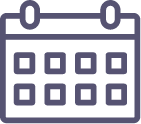We Accept Insurance
As effective as traditional anxiety treatment
Choose morning, midday, or evening therapy sessions
Save on travel, childcare, and other expenses
Anxiety ranges from an uncomfortable sensation to an all-consuming feeling that seems like it will never get better. However, with the right treatment, you can not only get better but also reach your goals and live a fulfilling life.
Modern’s online anxiety treatment
More than therapy – A complete program
We offer several ways for you to learn, develop, and get real human support as we help you navigate your way to feeling better. Modern is for people looking for a complete anxiety treatment program that goes beyond simple therapy.
- Personalized therapy: Your therapist will help you identify problems and design a treatment plan to guide your recovery.
- Group sessions: You’ll learn from the real-world experiences of others while giving and receiving support.
- Recovery coach: Leveraging their own personal experience overcoming anxiety, your recovery coach will be a constant presence, offering help, guidance, and a listening ear whenever you need it.
Modern vs other online anxiety therapy: What sets us apart?
Our approach is intensive and comprehensive, offering 3 to 5 sessions per week over a span of 4 to 6 weeks, ensuring efficacy comparable to in-person therapy. Here are some key aspects of our program:
- A treatment plan tailored to you: Unlike other forms of therapy that can leave you feeling lost, our program is individualized to your specific needs and goals.
- Accountability and monitoring: You’ll always have people around to keep you on the right track.
- Dependable people to talk to: You can rely on your therapist, peers, and recovery coach for ongoing guidance and support.
- Flexibility to meet responsibilities: We offer flexible scheduling around your other commitments. Choose morning, midday, or evening sessions.
- Get care wherever you are: Attend sessions from wherever you feel most comfortable.
Get specialized anxiety therapy
Different forms of anxiety require different treatment methods. Below are some common types of anxiety that we treat.
- Generalized anxiety disorder (GAD), which is marked by excessive worry over many areas of life.
- Social anxiety, which is feeling scared or uncomfortable in social situations.
- Phobias, which are strong fears of specific things, such as spiders or heights.
- Panic attacks, which are sudden episodes of intense fear that are hard to control and may be paralyzing.
There are also other types of anxiety. Contact us for more specific information about your unique condition and how we can help.
Anxiety treatment methods
At Modern, we employ evidence-based anxiety treatments matched to each individual participant. Because everyone is different, we’ll select methods that best help you understand your triggers and process your feelings. Here are a few common approaches:

Cognitive Behavioral Therapy
Identifying and working on problematic behaviors, thoughts, and emotional patterns.

Acceptance and Commitment Therapy
A way to accept thoughts and feelings while aligning actions, personal values, and goals.

Exposure Therapy
Training to reduce and slowly eliminate troubling responses to anxiety-provoking triggers.
Improve your life as you recover
We’ll help you build a personal toolkit that will equip you to understand your anxiety and respond to it in healthy ways. You’ll learn to develop the relationships and activities most important to you. Here are a few key benefits:
- Improve quality of life and relationships
- Learn how to be confident
- Be comfortable in social situations
- Handle life and work responsibilities
- Prevent and manage relapses
We accept insurance
We work with most major insurance providers to help minimize the cost of treatment. Let’s check whether your provider will cover your treatment.

We’re in-network with Blue Cross Blue Shield
More than treatment
Our program is more immersive than traditional therapy. We’ll tailor your treatment plan to improve the areas of your life you need help with. Though few online anxiety programs offer the following services, they are essential for helping you achieve your goals and feel better.
- Family involvement
- Academic support and vocational training
- Aftercare/extended care
- Dual diagnosis treatment
Masters-level therapists
When searching for online therapists for anxiety, experience is important. Our therapists are all masters-level and have extensive experience helping people in an online environment.
If you have specific questions about our team, therapists, or coaches, feel free to call or send a message.
Maintain your privacy and comfort
- Stigma-free space: We provide a judgment-free environment that supports and respects your decision to seek help.
- Complete privacy: Your comfort matters. Our online platform allows you to maintain your personal space while receiving the care you need.